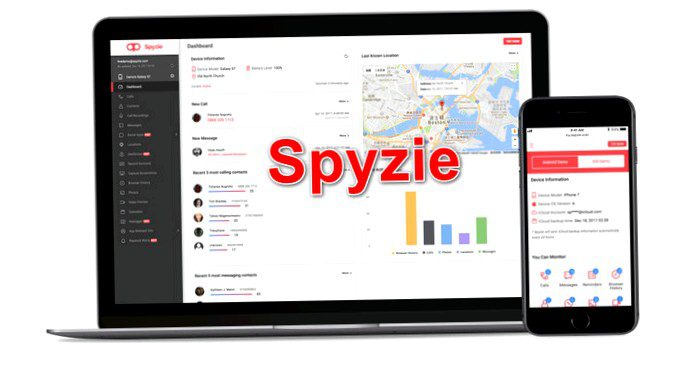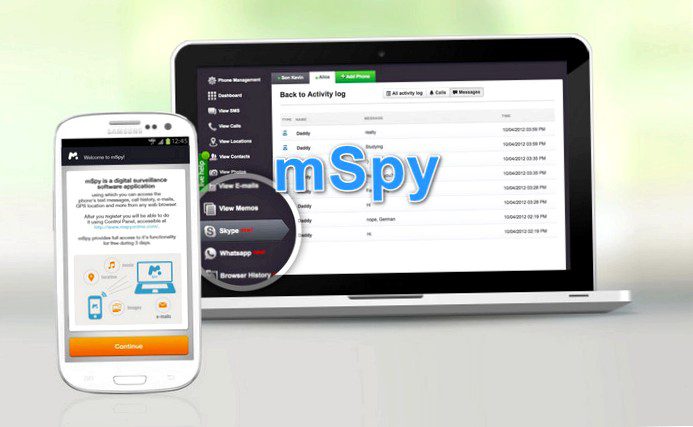You have been happy since you met and fell in love. Many years have passed, perhaps your relationship has quietly changed.
If you find,
- Your spouse or significant other comes home late and doesn’t spend as much time with you as they used to.
- Your spouse starts calling or texting / WhatsApp chatting regularly, but doesn’t tell you who the other person is.
- Your spouse has often traveled to another place, but not to a place you are familiar with.
- .
For whatever reason, you will be concerned and curious about. At this point, you need the applications that can monitor the cell phone. Fortunately, many people have a similar thought as you, so there are already products on the market that can meet your needs.
A brief introduction of two products:

Spyzie is a remote monitoring and control app for mobile devices. In addition to the usual monitoring of calls, SMS / MMS, internet and social media usage, it includes several proactive features such as app blocking, usage restriction and geofencing.
Then let’s take a look at a similar product — mSpy.

mSpy is probably the most popular monitoring software on the market today. It is one of the world’s leading providers of monitoring software designed entirely around end-user needs for protection, security and practicality.
With it, you can manage calls, view text messages, check email, locate GPS position, oversee internet usage, check instant messages, etc..
Both products are suitable for Android and iPhone and are very easy to use. Only with a simple registration and installation you can achieve what you want to do.
You can trust your spouse – but also your spouse trusts you?
If you are he one being supervised:
Sometimes you have some secrets that your spouse doesn’t want to discover. However, this led to unnecessary misunderstandings. Suddenly one day you discovered that your spouse has been using surveillance software to monitor your phone. What to do?

You may have something to hide or you may have nothing to hide, but no matter how you feel spied on, it feels like a terrible invasion of your privacy. The fact that your spouse is spying on you is also a warning sign that your relationship is in serious trouble.
Some forms of spying aren’t just offensive – they’re illegal. There is privacy between spouses after all. If your spouse installs monitoring software on your phone without your consent, it’s a violation of your privacy. In addition, this may be an unfavorable behavior for you. Z.B, if you’re in a divorce action, the information your spouse reveals through illegal spying, while not directly usable in a divorce or custody dispute can be. But if the information obtained illegally, however, leads to legal sources of information, spying on your spouse could hurt you in court.
How to make your phone more secure?
Now, we will present you with different ways to strengthen your cell phone’s security.
1. Update your software
Whether you’re running iOS, Android, or Windows Phone, we always recommend getting the latest available version of the operating system. This can be a little difficult, as Android updates often take a while to run tests from manufacturers and networks, but it’s worth it.
One reason we’re interested in the latest operating system is because it comes with all the added bonuses, whether it’s iOS 11’s control center or the clear bars on Android KitKat, but also because many security holes have been plugged.
Most manufacturers let you set your phone to automatically check for updates. So always make sure to check this box.
2. Use a secure lock screen
It seems almost pointless these days not to have a basic password on your lock screen, even if it’s a simple one. One of the first things we suggest is to navigate to your device’s security settings and enable a passport lock screen.
There are obvious benefits to just having a simple lock, but while Android’s face lock is fun to use, it’s not the most secure system. Many Google devices rate the effectiveness of each security system so you can make an informed decision.
3. Install antivirus software
One of the biggest threats that could lead to data loss is the less-than-modest virus. The problem is not as widespread as on desktop computers, and unless you download shady software, chances are you won’t discover anything malicious within a 2-year contract, but there is still a credible threat.
The problem seems to be less dangerous for iPhones, because Apple strictly controls the App Store. The open-source nature of Android makes it much more vulnerable, as malicious apps can be downloaded to the device without being checked by Google. In both cases, this can be counteracted by using mobile antivirus software.
Companies like McAfee, AVG and Lookout are in both the iOS App Store and Google Play Store for added security, but beware of apps that seem a bit suspicious.
If you are really concerned, visit the manufacturer’s website as most come with a link to their mobile app.
In addition, you can also:
- Disable apps from untrusted sources and don’t root or jailbreak your phone
- Use lock code apps and vaults
- Use the children / guest modes
- Keep location settings enabled
- Use portable technology
- Set up a SIM lock
- Keep confidential files off your phone
With so many problems with cell phone security, it is often necessary to back up cell phone data. We recommend using Tenorshare iCareFone, a file manager software that can selectively backup Apple device data and manage backup files.